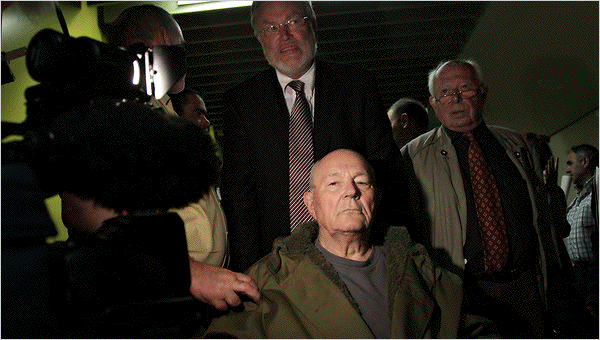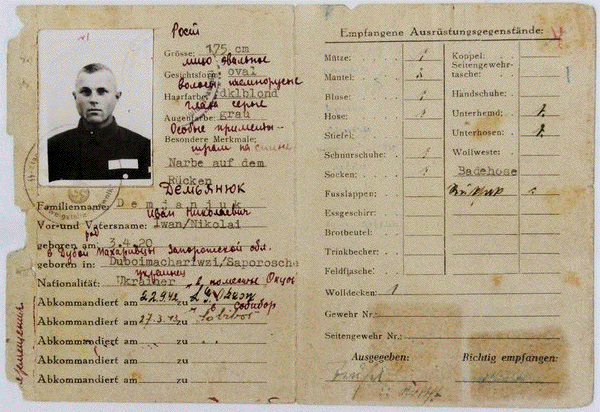
|
|
A
German court sentenced John Demjanjuk
to five years in prison for his role as
a Nazi death camp
guard.
|
MUNICH
--In what may be one of the last major Nazi war
crimes trials, a German court sentenced John
Demjanjuk, a former autoworker in Ohio, to five
years in prison after he was found guilty of
taking part in the murder of 28,000 people while
working as a guard at the Sobibor concentration
camp in Nazi-occupied Poland in 1943.
Mr.
Demjanjuk was nevertheless freed from pretrial
detention on Thursday while he appeals, which
could take a year. After the verdict Mr.
Demjanjuk, 91, was pushed out of the courtroom
in a wheelchair and paused briefly before
cameras, saying nothing but removing the dark
glasses he had worn throughout the
proceedings.
Relatives
of Sobibor victims, who were recognized as
co-complainants for the trial, said they were
satisfied with the verdict even though Mr.
Demjanjuk would at least temporarily be free.
The two years he has spent in jail will be
credited to his sentence.
"Whether
it's three, four or five years doesn't really
matter," said David van Huiden, who said he lost
his mother, father and sister after Nazis seized
them in Amsterdam and sent them to Sobibor. Mr.
van Huiden said he survived because his parents
sent him to walk the family dog before the
Germans came, and he hid with non-Jewish
friends.
Mr. van
Huiden said that the trial demonstrated the role
played by people like Mr. Demjanjuk, a Ukrainian
who, according to testimony, initially fought on
the Soviet side, but agreed to work for the
German SS after being captured in
1941.
"He took
part, he volunteered," Mr. van Huiden said. "You
don't kill so many people without the help of
guards."
Mr.
Demjanjuk spent most of the proceedings, which
lasted much of the day, lying on his back in a
bed set up not far from where Judge Ralph Alt
read the sentence in a sweltering courtroom.
With his face hidden behind a blue baseball cap
and dark glasses, Mr. Demjanjuk remained nearly
motionless, occasionally lifting a knee or an
arm but showing no reaction to the
proceedings.
The
verdict comes after decades of legal proceedings
in three countries involving Mr. Demjanjuk.
After losing his United States citizenship in
1985 for lying about his past, Mr. Demjanjuk was
deported to Israel and accused of being a
particularly brutal guard known as Ivan the
Terrible at the Treblinka camp.
But an
Israeli high court overturned the conviction and
death sentence in 1993, ruling that Mr.
Demjanjuk was not Ivan even though it appeared
he had been a guard at Sobibor, which was in
Poland.
Mr.
Demjanjuk returned to the United States, but
after more years of legal proceedings he was
deported to Germany in 2009 to face
trial.
The long
legal battle made Mr. Demjanjuk one of the most
well-known war crimes suspects, even though he
was said to have ranked low in the camp
hierarchy. Victims said that did not matter. "He
is a very small fish," said Rudie S. Cortissos,
whose mother was killed in Sobibor. "But whether
you are a whale or a sardine, someone who went
wrong this way should be punished."
Mr.
Demjanjuk's defense lawyers argued that an SS
identity card and other documents were falsified
by the Soviets. But Judge Alt said there was a
clear trail of documents and testimony that
demonstrated Mr. Demjanjuk's path from Soviet
prisoner of war to Sobibor guard.

|
|
A
duty card issued to the man known as
John Demjanjuk notes that in 1943 he
arrived at the Sobibor concentration
camp, where he worked as a guard.
|
After
Sobibor was shut down in late 1943, Mr.
Demjanjuk served in a Ukrainian unit that fought
on the Germans' side and was captured by
American forces at the end of the war, according
to testimony. After several years in a displaced
persons camp in Germany, Mr. Demjanjuk settled
in Ohio and worked in an auto factory, according
to the court findings.
In an
e-mail, Mr. Demjanjuk's son, John Demjanjuk Jr.,
said that "there remains not a scintilla of
evidence he ever hurt a single person
anywhere."
"While
some may take satisfaction from this event," he
wrote, "this verdict is no more definitive today
than the wrongful Israeli conviction and death
sentence was previously."
But Judge
Alt said that it was impossible for anyone to
have worked at Sobibor and not be part of the
Nazi death machinery. Every one of the guards
"knew he was part of an organization with no
other purpose but mass murder," the judge
said.
In painful
detail, the judge recited dates when transport
trains arrived in Sobibor, the number of people
aboard and names of individual prisoners who
were family members of co-complainants. Mr.
Cortissos's mother arrived on May 21, 1943, with
2,300 other prisoners, mostly Dutch Jews who
were sent immediately to gas chambers. Another
train carried mostly children, who were also
gassed immediately.
The court
rejected arguments that Mr. Demjanjuk would have
had no choice but to work in the camps. Judge
Alt said that many of the Ukrainians recruited
to work for the SS successfully escaped after
learning the nature of the work, and Mr.
Demjanjuk had a duty to do the same.
"An escape
with a chance of survival was possible," Judge
Alt said.
The judge
said that Mr. Demjanjuk could easily have earned
the maximum sentence of 15 years. But he said he
took into account Mr. Demjanjuk's age and the
fact that he had no influence over the number of
prisoners sent to the camp.
Mr.
Cortissos, who survived the war by hiding in
Amsterdam, where he still lives, said that he
appreciated the chance to describe his
experiences during the trial.
"I had an
opportunity to say what I wanted to say for 50
years," Mr. Cortissos, 73, said outside the
courtroom. "I'm satisfied." He added, "It
doesn't mean I can forget; it doesn't mean I can
forgive."
Jack
Ewing reported from Munich, and Alan Cowell from
Paris.
Stefan Pauly contributed reporting from
Berlin,
and Isabel Kershner from Jerusalem.
..
|